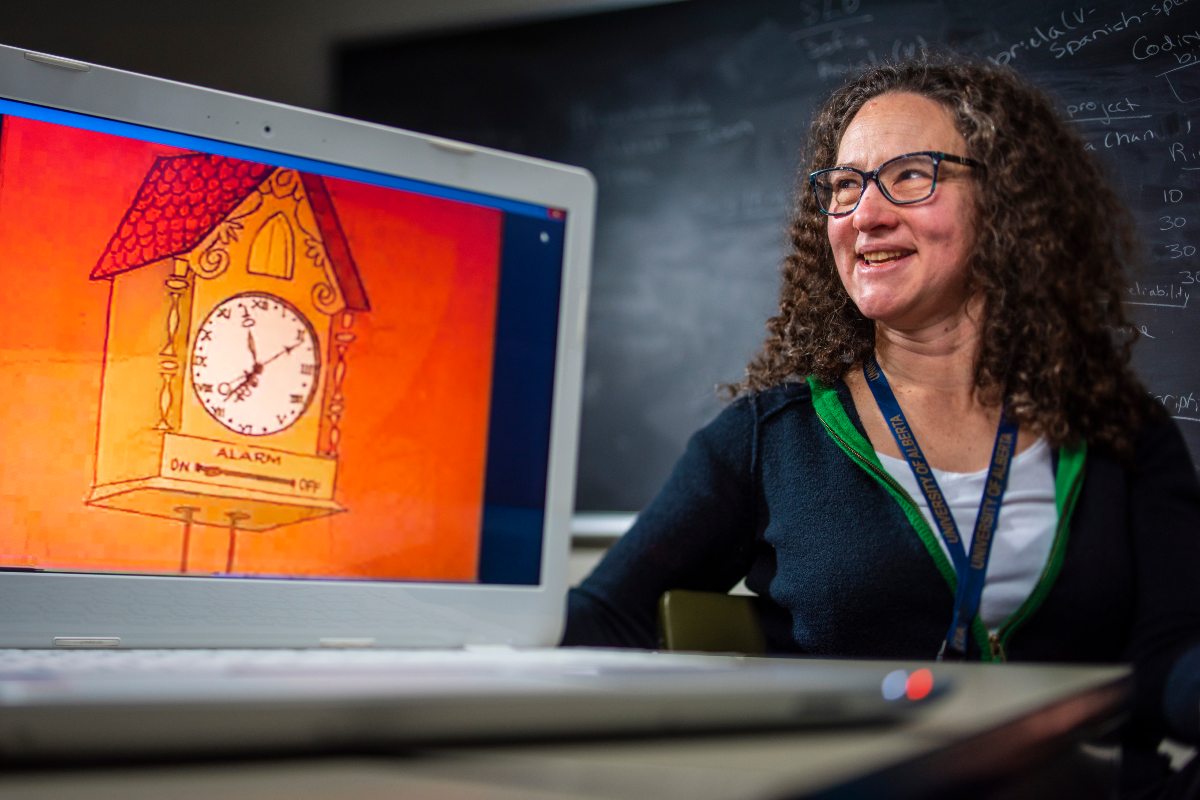
A professor in the University of Alberta’s Department of Psychology, Nicoladis is an expert in the fields of developmental psychology and language. Photo credit: John Ulan
When asked what students who are curious about her field might want to know Elena Nicoladis replied, “Psychology has exceedingly few answers and a panoply of extraordinarily beautiful questions.”
A professor in the University of Alberta’s Department of Psychology, Nicoladis is an expert in the fields of developmental psychology and language. And she is passionate about sharing and exploring some of those extraordinarily beautiful questions with her students. Through her teaching, she hopes to instill her students with the ability to learn from evidence, articulate their beliefs, and that the best process of learning involves being wrong from time to time—and learning from mistakes.
Hear more from Nicoladis on psychology, teaching, and her advice for students learning remotely during the COVID-19 pandemic.
What do you teach?
What I hope I teach is how to articulate your stance and back it up with evidence and how to change your mind when better evidence is presented. I also hope to teach my students that the process of learning inherently involves being wrong and learning from those mistakes.
Demonstrably, I teach courses on developmental psychology, such as Lifespan Developmental Psychology (PSYCO 223), and, more recently, the Honors Seminar (PSYCO 300A & 300B).
What do you love about your field?
I love how we can see the mystery in what, at first glance, seems familiar and therefore explained—though I’m not sure that’s unique to my field! So, let me give you an example. Once, at the end of a course on psycholinguistics, a student commented to me, “This was fun. I never really thought about language before.” Ha! I think about language everyday!
What should students who are interested in this topic know?
Psychology has exceedingly few answers and a panoply of extraordinarily beautiful questions.
Tell me about your passion for teaching. What inspires you?
It is unbelievably gratifying to witness students’ development. For example, when students make an excellent hypothesis and test it and find out it is wrong, it is fun to observe how they come to terms with where their reasoning went wrong. Similarly, it is fun to see students speak about a project or an issue that they care about with convincing arguments.
How do you cultivate a community of practice with your fellow instructors?
I’m nosey. I like to know what my colleagues are doing with their teaching. And I like to share their best tips with other people.
Our world has been turned upside down during the COVID-19 pandemic. What advice would you give students on learning in a remote environment?
Much of my advice is the same as always. Top priorities should be to eat and sleep well, follow a routine, work out on a regular basis, watch out for excesses in caffeine and alcohol, and keep in touch with your family and friends while in school.
Learn effective study habits and stick to them. Communicate with your instructor if there are events in your life interfering with your ability to study effectively. Engage in the material and with classmates. Ask questions. Try to connect the material to your life.
Try to keep in mind that academics don’t usually invent multisyllabic words of jargon just to make undergraduates miserable—think about what they are trying to communicate and take advantage of opportunities. You always learn something from every class you take (what you learn may not be the learning outcomes the instructor had in mind, but you always learn something).
In a remote environment, motivation and engagement will probably be particularly difficult. Setting up your life to stick to a good routine by whatever means work for you will be exceedingly important.
What is one thing that people would be surprised to know about you?
That’s a tough one. Some students have expressed surprise at learning that I am extremely introverted.
After graduate school, I spent a good four years of my life trying to drop out of academics. I may still succeed in dropping out one day. But, thus far, I have spectacularly failed to do so.
Curious to learn more? Find more information on teaching and learning in the University of Alberta’s Faculty of Science.